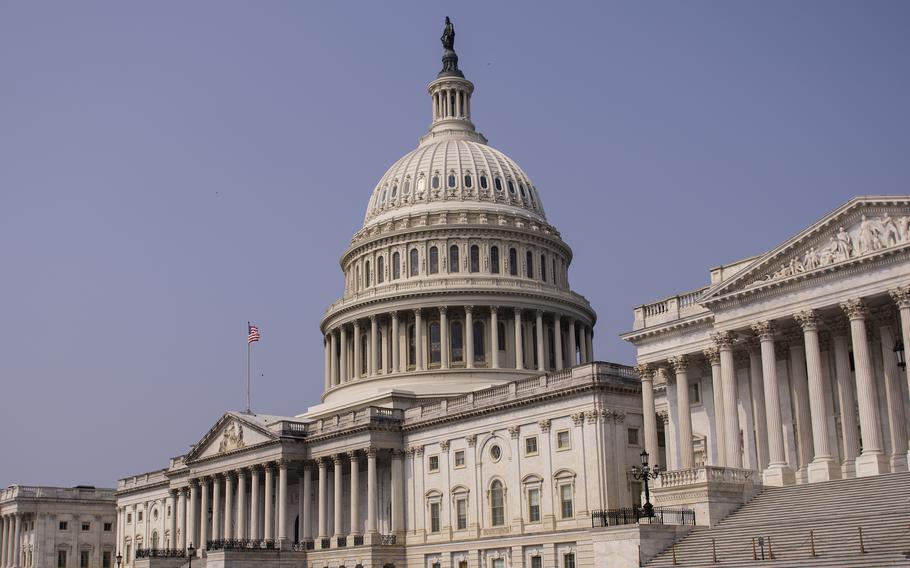
A compromise version of the National Defense Authorization Act, an annual must-pass bill that outlines priorities and spending for the Defense Department, includes a significant pay bump for E-1 to E-4 troops as part of a wide-ranging effort to improve housing, health care, child care and spousal support for service members and their families. (Carlos Bongioanni/Stars and Stripes)
WASHINGTON — Junior enlisted service members are set to receive a 14.5% pay raise next year alongside a 4.5% pay hike for all troops under a compromise defense policy bill expected to be voted on this week.
The final version of the National Defense Authorization Act, an annual must-pass bill that outlines priorities and spending for the Defense Department, includes a significant pay bump for E-1 to E-4 troops as part of a wide-ranging effort to improve housing, health care, child care and spousal support for service members and their families.
The quality-of-life improvements were spearheaded by House lawmakers to boost morale and improve recruitment and retention. Pay for junior enlisted troops was of particular concern because it had failed to keep pace with inflation and private-sector compensation, forcing some families to rely on food banks.
“Our service members deserve better than food stamps,” Rep. Mike Garcia, R-Calif., a former Navy pilot, wrote Saturday on X. “This historic raise is how we fix it.”
The House had recommended a 19.5% pay raise for junior enlisted personnel earlier this year while the Senate had countered with a 5.5% raise — slightly above the 4.5% pay increase the White House had requested for all troops.
The White House opposed a large change to junior enlisted pay, warning it would be too costly and permanently alter military pay tables. Funding for the larger paychecks still needs to be negotiated by the appropriations committees in both chambers of Congress.
The defense policy bill unveiled Saturday night authorizes $895 billion in national defense spending, including $850 billion for the Pentagon.
Contained in that sum is a $2 billion investment in new barracks and family housing, the construction of more Defense Department schools and child care centers, expanded bonuses to improve hiring of medical personnel and higher salaries for child care workers.
The legislation also makes it easier for military spouses to transfer professional licenses between states and gives service members direct access to specialty medical providers by waiving referral requirements.
Many of the divisive culture war issues pushed by Republicans in the House’s version of the defense bill were scrubbed from the final legislation. The provisions would have ended the Pentagon’s abortion travel policy, eliminated diversity, equity and inclusion offices, and barred Tricare health coverage of gender-transition procedures.
However, the final bill maintains a hiring freeze for diversity-related positions and includes a controversial provision that prohibits Tricare from providing gender dysphoria treatments for military dependents younger than 18 that could result in sterilization.
Rep. Adam Smith of Washington, the top-ranking Democrat on the House Armed Services Committee, on Sunday condemned the ban on gender-affirming treatment for minors and called on House Speaker Mike Johnson to rescind it.
“Blanketly denying health care to people who clearly need it, just because of a biased notion against transgender people, is wrong,” Smith said in a statement. “This provision injected a level of partisanship not traditionally seen in defense bills.”
Johnson, R-La., told the conservative media company The Daily Wire on Saturday that the provision eliminated taxpayer funding for treatments that could permanently harm young people.
“In this year’s NDAA, we’re taking a critical and necessary step to protect the children of American service members from radical gender ideology and experimental drugs,” he said.
The final defense authorization bill also raised some concerns among Republicans. Sen. Roger Wicker of Mississippi, the top Republican on the Senate Armed Services Committee, bristled at the omission of his proposal to raise the spending topline by $25 billion.
“Many senior flag officers, defense strategists, and other experts continue to note that this is the most dangerous moment since World War II,” he said in a statement Monday. “Not only does this NDAA thwart the bipartisan will of the Senate, but it signifies a profound missed opportunity to strengthen President-elect [Donald] Trump’s hand when he takes office.”
Members of both parties found common ground on spending for the Navy, authorizing a second Virginia-class attack submarine after the service had asked for one and approving a third Arleigh Burke-class destroyer after the Navy had asked for two.
Lawmakers also signed off on the Air Force’s request to shift space-focused Air National Guardsmen into the Space Force despite opposition to the plan from all state governors and many National Guard officials. The move will affect 578 personnel.
A bipartisan effort to make changes to the military draft failed to make the cut. The final bill does not include a Senate proposal opposed by conservatives requiring women to register for the Selective Service in case of a draft and drops a provision to make registration automatic for men.
The House is expected to vote on the defense policy bill this week, followed by a vote in the Senate by the end of the month.